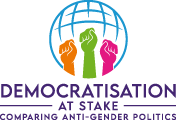Working Group 2
Deciphering the triangle of state, civil society and anti-gender actors with a focus on politicized Religion
Working Group 2 (WG2) explores the complex interplay between the state, civil society, and anti-gender actors, with particular attention to the role of politicized religion. The group’s research is structured around three focal points that define its approach: the transformation of state-society relations, the mobilisation of anti-gender actors, and the increasing entanglement of religious narratives in political discourse.
Central to WG2’s work is the investigation of how opposition to gender equality is conceptualised and mobilised as a social and political project in different regional and national contexts. The group examines which specific understandings of gender equality and gender equality policies are targeted by anti-gender groups and political actors, and how these attacks are framed in public and institutional discourse.
WG2 also analyses why certain anti-gender discourses and practices gain traction in some locations more than others, and what forms these discourses take depending on the political and cultural environment. This includes identifying the causal mechanisms that drive anti-gender dynamics, as well as how these concepts and strategies travel across borders—particularly within and between non-Western societies—highlighting the transnational nature of these movements.
Another key focus of WG2 is the impact of anti-gender politics on the relationship between the state and society. The group studies how state institutions reshape their connections with different societal groups, especially with regard to their popular bases and various female constituencies, under the influence of anti-gender agendas. This includes an examination of how these dynamics affect democratic processes and civic participation.
Crucially, WG2 investigates the role of politicised religion in this context. The group looks at how conservative religious institutions, religious-conservative NGOs, and faith-based groups contribute to the development and dissemination of anti-gender narratives. This includes exploring the influence of political Islam and various Christian denominations on current forms of anti-feminist state policies. WG2 interrogates whether these actors are reviving older forms of religiously motivated anti-feminism, or whether new constellations are emerging that bind religion, politics, and gender into novel ideological formations.
Through comparative and interdisciplinary research, WG2 aims to better understand the shifting alliances and power structures that sustain and advance anti-gender mobilizations globally.
Leadership positions
WG2 Leader: Dr. Sarka Kolmasova
WG2 Co-Leader: Dr. Susana Galan

